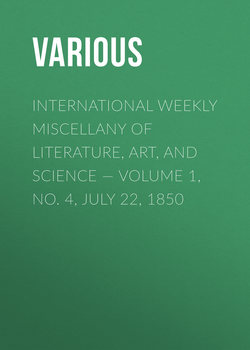Читать книгу International Weekly Miscellany of Literature, Art, and Science — Volume 1, No. 4, July 22, 1850 - Various - Страница 3
LITERARY COTERIES IN PARIS IN THE LAST CENTURY THE HAIR
ОглавлениеCHEMICALLY AND PHYSIOLOGICALLY CONSIDERED.—Each hair is a tube, containing an oil, of a color similar to its own. Hair contains at least ten distinct substances: sulphate of lime and magnesia, chlorides of sodium and potassium, phosphate of lime, peroxide of iron, silica, lactate of ammonia, oxide of manganese and margaim. Of these, sulphur is the most prominent, and it is upon this that certain metallic salts operate in changing the color of hair. Thus when the salts of lead or of mercury are applied, they enter into combination with the sulphur, and a black sulphuret of the metal is formed. A common formula for a paste to dye the hair, is a mixture of litharge, slacked lime, and bicarbonate of potash. Different shades may be given by altering the proportions of these articles. Black hair contains iron and manganese and no magnesia; while fair hair is destitute of the two first substances, but possesses magnesia.
No one ever possessed all the requisites of masculine or feminine beauty without a profusion of hair. This is one of the crowning perfections of the human form, upon which poets of all ages have dwelt with the most untiring satisfaction. However perfect a woman may be in other respects; however beautiful her eyes, her mouth, teeth, lips, nose or cheeks; however brilliant her expression, in conversation or excitement, she is positively disagreeable without this ornament of nature. The question is sometimes asked, "What will cure love?" We answer, scissors. Let the object be shorn of hair, and you may take the word of a physiologist, that the tender passion will lose its distinctiveness; it may subside into respect: it is more likely to change into a less agreeable emotion.
In man, the hair is an excellent index of character. As the beard distinguishes man from woman, so its full and luxuriant growth often indicates strength and nobleness, intellectual and physical; while a meager beard suggests an uncertain character—part masculine, part feminine. Was there ever a truly great man, or one with a generous disposition, with a thin beard and a weazen face? On the other hand, show me a man with "royal locks," and I will trust his natural impulses in almost every vicissitude. When we see a genuine man, upon whom Nature has declined to set this seal of her approval, we cannot help an involuntary emotion of admiration for the virtuous and persevering energy with which he must have overcome his destiny.
Pertinent hereto: we have read with unusual satisfaction the arguments for Beards in Dr. Marcy's Theory and Practice of Medicine and the pleasant essays in the same behalf which John Waters has printed in the Knickerbocker. Our conservatism yields before these reformers, who would bring custom to the proprieties of nature.
WHAT'S IN A NAME?—A good deal, sometimes. Thus, the truth of the adage of "give a dog a bad name," &c., has lately been exemplified in a singular manner. Eugene Sue, you may remember, causes some of the most terrible events in the Mysteres de Paris to occur in the Allée des Venves, a fine avenue in the Champs Elysees. This has had the effect of giving the unfortunate Allée—though as quiet, modest, well-behaved, moral street as need be—a detestable reputation; people have shunned it as if it were a cavern of cutthroats—those condemned to live in it have felt themselves quasi-infamous—its rents have fallen, its shops stood empty, its business has dwindled away. The owners of its houses, and its few remaining inhabitants and shopkeepers, have for months past been pestering the municipality of Paris to devise means of restoring its fallen prosperity, and removing the monstrous stigma attached to it. At last, moved by compassion, the municipality has given permission to have the name changed to "Avenue de Montaigne." The ex-Allée, says the writer who informs us of the circumstance, is in great jubilation, and is crying with enthusiasm "Je suis sauvee!"
"NAMES HIGH INSCRIBED."—It is stated that the names of nearly every distinguished man in every department of literature and science, from the remotest antiquity down to the present time, are inscribed in letters of gold on the outside of the new Bibliotheque de Sainte Geneviève, which is now rapidly approaching completion. The list is naturally one of tremendous length, and covers not less than three whole sides of the vast building. It is impossible not to admire the spirit in which it has been devised, and the impartiality with which it has been executed. Altogether, it does the highest credit to the Parisians, and especially to their municipal authorities. The names are arranged in chronological order, but without date, and without regard to the nationality of, or to the peculiar distinction achieved by the individual; thus the two last names are those of Berzelius, the Swedish savant, and Chateaubriand; and a little above them figures Walter Scott, Byron, and other English immortals. Living celebrities are of course excluded.
MR. HARTLEY, a benevolent English gentleman, directed in his will that £200 should be set apart as a prize for the best essay on Emigration, and appointed the American Minister trustee of the fund. The Vice Chancellor has decided that the bequest is void, for the reason that such an essay would encourage people to emigrate to the United States, and so to throw off their allegiance to the Queen! Another decision equally wise was made at the same time in regard to a prize for a treatise on Natural Theology. The learned Vice Chancellor regarded it as calculated to "subvert the Church."
